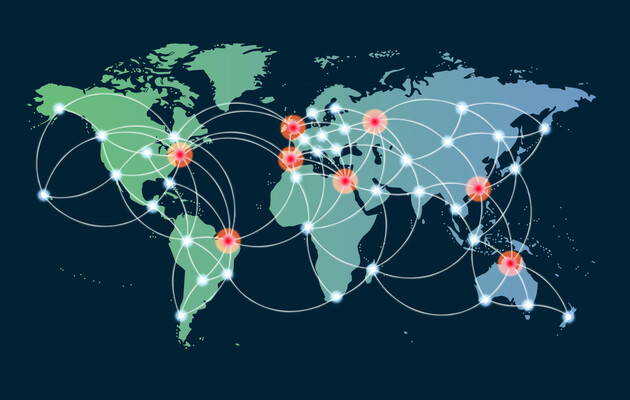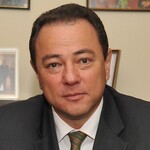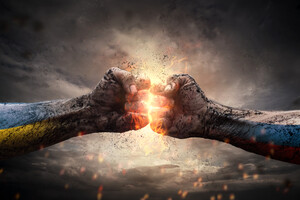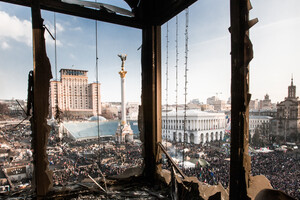Do the “Global South” and the “world majority” fall into the “non-West” or “non-Russia” category?
The anniversary of the “three-day war,” which has been going on for nine years, has prompted a huge number of publications written attempting to analyze what is happening. Unfortunately, many of them contain superficial, or even completely incorrect assessments. Many use Russian narratives and proposals to achieve so-called peace, which create the illusion that the aggressor can be pacified on the basis of Ukraine’s acceptance of a certain “reality.”
The quality of political analysis has deteriorated over the past ten (if not more) years on both sides of the so-called Iron Curtain, which fell in 1991. This process has become especially evident during the war. In a strange way, it has become clear that allowing oneself the luxury of saying things that directly contradict reality and at the same time remaining among the intellectual "elite" with equal success is possible both in advanced democracies, where freedom of speech is taken for granted as a basic human right, and where a single act of protest – holding a blank sheet of paper – can get you ten years in prison. Chomsky, Mearsheimer, Sharap, Sachs – these are just a few examples of the obvious intellectual decline on the part of the “West.” Karaganov, Surkov, Lukyanov, Borodachev, and Trenin are the examples of bright representatives of the mythmakers’ cohort from the “East.” Dugin, obviously, is a classic character of this genre, and, eventually, it is to be determined by an international tribunal, what category Putin falls under to assess his contribution.

The wrong assessment of the results of the Cold War and the inability clearly to explain the essence of the processes having taken place in the post-Soviet space in the early 1990s caused a number of incorrect political decisions on the part of the “West.” Nowadays, even there, the rotten core of the Russian mentality, alongside the underestimation of the national liberation movements in the republics of the former USSR, has become quite obvious. And then the significant nuclear potential, which was inherited by the three republics that gained independence, overshadowed the purity of consciousness. Instead of creating a balanced security space that would exclude a new nuclear confrontation with another monster, a decision was made to “reset” relations with Russia, integrate it into international structures and support Putin at the time of the change of power back in 1999.
When the errors of analysis and policy decisions became obvious, there were attempts to explain what was happening by building new theories. “Eastern” analysts like Russian military intelligence colonel Dmitry Trenin, who for unknown reasons was head of the Moscow Carnegie Center until 2022, i.e., the time of its dissolution, joined their creation. Few of Moscow’s foreign policy and defense experts had more serious connections than this man, now expelled from the Royal Swedish Academy of Military Sciences “for his active support of the unjustified and illegal Russian invasion of Ukraine, both verbally and in writing.”
Inter alia (thanks to Trenin, but not only to him), such terms as “collective West” and “global South” appeared and took hold in the lexicon of political analysis at the same time –and developed a new concept in the very recent invention of Lukyanov-Karaganov under the code “world majority.” However, the new theories, if we disregard the obfuscating language, could explain neither the causes nor the consequences of the destruction of the established world order, although they sounded convincing. As Albert Einstein said, “a theory is when you know everything, but nothing works...” This definition may well be considered the slogan of the current historical moment.
It must be admitted that the “Eastern” troupe of political clowns was more consistent in its false views about the world than the “Western” one. The “collective Putin,” as James Scherr aptly called them, neither during nor after the Cold War could recognize the realities, continuing to fight external enemies to keep internal ones under control. Faithful Leninists perfectly learned the teachings of the leader of the world proletariat, who said that “there is no more erroneous and more harmful idea than the separation of foreign from domestic politics. “It is during the war,” Lenin wrote in his incomparable footless style, “that the terrible lie of such separation becomes even more terrible.” The regime built by them rests on the myth of an external threat and extremely tight control over any alternative information flows. Many times, the puppeteers of modern Russia tried to formulate a certain national idea, eventually named by Surkov the “Russian world.”
This is how Karaganov, one of the dedicated ideologues of ruscism (Russian fascism), reflected on this in September 2022, in the midst of the war: “I wrote many times about the need to put forward a new “Russian idea,” a national state ideology. Now it is especially urgently needed – not only for mobilizing the spiritual forces of the society, but also as a practical tool of domestic and foreign policy.” “The Russian idea is even more obvious to the world. We are a civilization of civilizations, a stronghold of resistance to neo-colonialism, free development of civilizations and cultures. ... Our current struggle against the expansion of the West, against the worst of it, which was concentrated in Ukraine, is a struggle for a new just world order. Almost all of these ideas have already been mentioned by President Vladimir Putin in one way or another. It remains to line them up in a single line and purposefully promote them.”
Leaving aside the extreme hypocrisy of such verbal constructions, it is very interesting to see what the “collective Putin” is promoting now. These are mostly not new in substance, but slightly changed in terminology, the ideas of confrontation between the “collective West” and the “world majority,” in the center of which is “fortress Russia.” In the West, instead of the “majority,” the “global South” is more popular. The problem is that everyone brings their own personal vision to these definitions, which only confuses things. Let’s try to understand this important terminology.
The “world majority” is anything but Western, or indeed the same as “Greater Eurasia.” It is, according to Fyodor Lukyanov’s calculations, 85% of the global population. Of course, India, China, Indonesia, Malaysia, and other densely populated countries are included. The Ambassador of the Russian Federation to the USA, and now Putin’s assistant, Yuri Ushakov, made a very interesting remark about this: “We can already say that a new powerful, constructive force is forming in the Eurasian space – the so-called world majority, which defends fair and universal principles and approaches. Moreover, these approaches and principles completely collide with the interests of such huge regions as Africa and Latin America, which also do not accept modern forms of neocolonialism, or a world system built on “rules determined by the you-know-who” (it’s about the Western concept of rules-based order).” Here it is, the criterion for belonging to the “world majority” – rejection of an order based on rules.
A kind of synonym for the “world majority” is the “global South.” There are many attempts to give this concept a kind of legitimacy by drawing maps, lines on the globe model, and making lists of the countries of the advanced industrialized “North” and the backward, impoverished “South.” But here is the disaster. Of the countries of the “twenty,” where India, a member of the “global South,” currently presides, nine belong to this geopolitical category. Japan and South Korea are excluded from it, but for some reason not flourishing Singapore, Israel is excluded, but not the monarchies of the Persian Gulf. The stock market value of Saudi Aramco alone exceeds USD 2 trillion, which is more than the combined GDP of Russia and its current satellites. And, of course, the actual sentence for both concepts is voting for UNGA resolutions, where two-thirds of UN members regularly support a rules-based world order, and two-thirds of them are the votes of the “global South.” The majority of the world is not “non-West,” but also “non-Russia,” so the ideologues of ruscism should be more careful with theories – in their interpretation they do not work.
However, the concept of the “world majority,” which supposedly supports Moscow’s position, is obviously designed for domestic consumption; similarly, as Putin’s theory that the West dreams of dismembering Russia. He spoke about it in 1999 during the Balkan crisis, and in 2004 during the Beslan tragedy, and continues to discuss it today. His claim is nonsensical. China, India, and other countries, which are considered the “majority” by the Russian Federation, need order very much, and they participate in its creation. There is no denying the fact that globalization has opened unprecedented opportunities for growth to the countries of East and Southeast Asia. According to GDP growth rates even in 2022, the first nine places in the world are occupied by the states of the “Global South.” The best growth rates among the states of the “North” – in the Netherlands – are half as low as in "Southern" Argentina. Nothing to say about the USA. Even the global distribution of wealth, like the number of billionaires and multi-millionaires, is shifting towards China and India at a tremendous speed. These two countries, together with Russia and Brazil, are among the top 10 countries in terms of the number of high net worth individuals.
The “collective West” should also be approached with caution. Especially taking into account the fact that it includes both Japan and South Korea, and Australia and New Zealand. European experts have repeatedly stated that the frivolous use of this term is counterproductive. It creates the illusion that individual countries of the democratic camp do not have their own points of view and differences that should be considered in order to achieve real unity.
As one of Murphy’s Laws says, simple solutions to complex problems are almost always wrong. The tensions between the “collective West” and the “world majority” or the “global South” as one of the explanations for the causes of war as a tool for changing the world order is too simple and, fundamentally, the wrong formula. In Japanese, the word “crisis” is written with two kanji 危南. One means “danger” or “threat” and the other means “opportunity” or “chance.” It is very important to correctly combine concepts. This is the only way to get to the bottom of it.
Please select it with the mouse and press Ctrl+Enter or Submit a bug
















 Login with Google
Login with Google